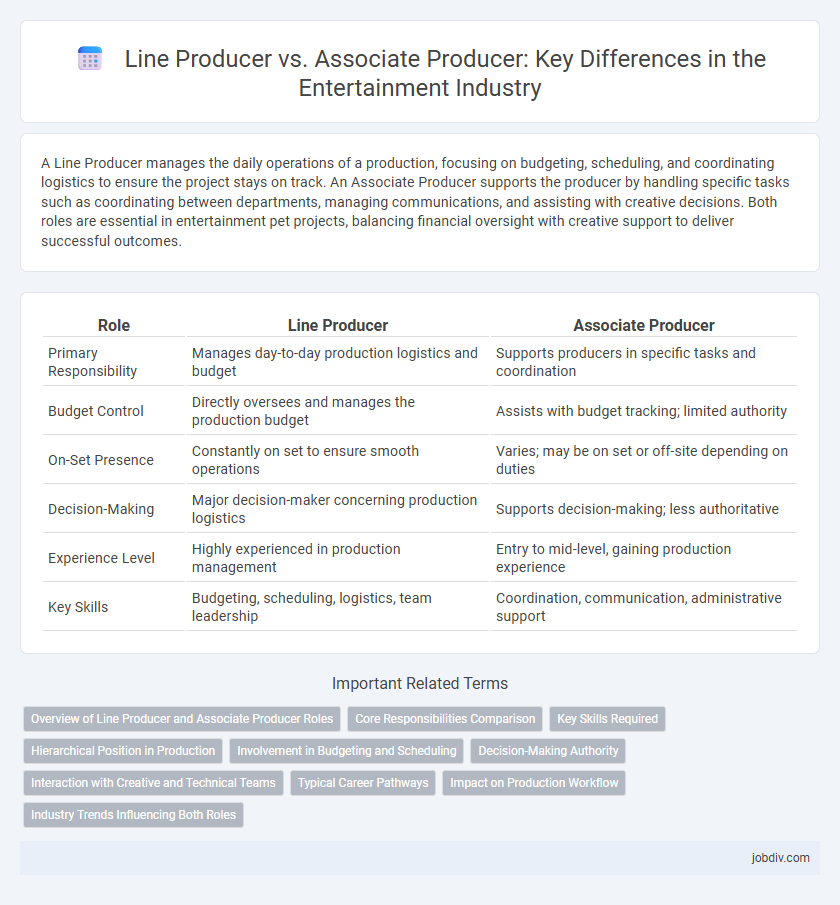A Line Producer manages the daily operations of a production, focusing on budgeting, scheduling, and coordinating logistics to ensure the project stays on track. An Associate Producer supports the producer by handling specific tasks such as coordinating between departments, managing communications, and assisting with creative decisions. Both roles are essential in entertainment pet projects, balancing financial oversight with creative support to deliver successful outcomes.
Table of Comparison
| Role | Line Producer | Associate Producer |
|---|---|---|
| Primary Responsibility | Manages day-to-day production logistics and budget | Supports producers in specific tasks and coordination |
| Budget Control | Directly oversees and manages the production budget | Assists with budget tracking; limited authority |
| On-Set Presence | Constantly on set to ensure smooth operations | Varies; may be on set or off-site depending on duties |
| Decision-Making | Major decision-maker concerning production logistics | Supports decision-making; less authoritative |
| Experience Level | Highly experienced in production management | Entry to mid-level, gaining production experience |
| Key Skills | Budgeting, scheduling, logistics, team leadership | Coordination, communication, administrative support |
Overview of Line Producer and Associate Producer Roles
Line Producers manage the daily operations of film production, overseeing budgets, schedules, and coordinating between departments to ensure smooth workflow. Associate Producers assist in various production tasks, often handling specific delegated responsibilities such as post-production coordination or talent management. Both roles are essential, with the Line Producer focusing on logistical execution and the Associate Producer supporting creative and administrative functions.
Core Responsibilities Comparison
Line Producers manage the daily operations of film production, overseeing budgeting, scheduling, and coordination of crew to ensure the project stays on track and within financial limits. Associate Producers support the production by handling specific segments such as post-production coordination, talent liaison, or research, contributing to creative and administrative tasks as delegated by senior producers. The Line Producer's core responsibility lies in logistical execution, whereas the Associate Producer focuses on assisting with varied production elements to facilitate the overall workflow.
Key Skills Required
Line Producers must excel in budget management, scheduling, and resource allocation to ensure smooth production workflows. Associate Producers require strong communication, coordination, and multitasking abilities to support creative and logistical aspects across departments. Both roles demand leadership, problem-solving skills, and a deep understanding of the entertainment industry's production processes.
Hierarchical Position in Production
A Line Producer typically holds a higher hierarchical position than an Associate Producer, managing the day-to-day physical aspects of a production including budgeting and scheduling. The Associate Producer supports the Line Producer by coordinating specific segments and communicating between departments to ensure smooth operations. Hierarchically, the Line Producer has more authority over logistical decisions, while the Associate Producer plays a crucial but subordinate role in overseeing production details.
Involvement in Budgeting and Scheduling
Line Producers hold primary responsibility for budgeting and scheduling in film and television production, managing day-to-day operations to ensure the project stays on financial and timeline targets. Associate Producers often assist with specific segments or tasks but have limited authority over the overall budget and schedule decisions. The Line Producer's role is critical in aligning resources, coordinating departments, and mitigating risks associated with production costs and timelines.
Decision-Making Authority
Line Producers hold primary decision-making authority on set, overseeing budget allocation, scheduling, and daily operations to ensure production efficiency. Associate Producers support by managing specific tasks or departments but typically lack the comprehensive authority to make major financial or logistical decisions. This clear distinction in decision-making power significantly impacts the scope and responsibility each role carries during film and television production.
Interaction with Creative and Technical Teams
A Line Producer manages the day-to-day logistics and budget, coordinating closely with technical teams to ensure schedules and resources align with production goals. An Associate Producer facilitates communication between the creative and technical teams, supporting the creative vision while helping solve practical challenges during filming. Both roles require strong interpersonal skills to balance creative ambitions with technical realities, promoting efficient collaboration on set.
Typical Career Pathways
Line Producers typically advance from production coordinators or assistant production managers, gaining expertise in budgeting and on-site management. Associate Producers often start as production assistants or editors, focusing on content development and creative coordination. Both roles require progression through hands-on experience and networking within film or television production environments.
Impact on Production Workflow
Line Producers oversee daily operations, managing the budget, schedule, and crew coordination to ensure seamless production workflow. Associate Producers support various departments by handling specific tasks such as logistics, communication, and post-production assistance, streamlining processes without directly controlling the budget. The collaboration between both roles optimizes efficiency, with the Line Producer driving overall production management and the Associate Producer facilitating task execution.
Industry Trends Influencing Both Roles
Line producers and associate producers are adapting to industry trends such as the rising demand for streaming content and the integration of virtual production technologies. Line producers increasingly manage complex budgets and schedules to accommodate rapid production timelines and diverse shooting locations, while associate producers are expanding their roles in digital marketing, content distribution, and audience engagement strategies. Both positions require agility in navigating evolving workflows driven by data analytics and remote collaboration tools within the entertainment sector.
Line Producer vs Associate Producer Infographic

 jobdiv.com
jobdiv.com